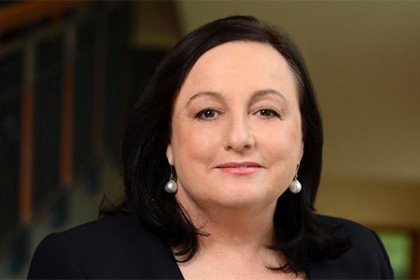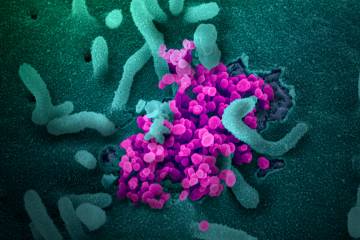Patricia Davidson, dean and professor at the Johns Hopkins School of Nursing, is a registered nurse who has focused her career on developing innovative models of person-centered care delivery and evidence-based teaching. She joined Sarah LaFave, a PhD student at the Johns Hopkins School of Nursing, to discuss how nurses are leading the COVID-19 response around the globe, and how much of that work is not a departure from what nurses do in "normal" times. The conversation has been edited for length and clarity.
By now, many people are aware of the role nurses play on the front lines of this pandemic. Tell us a little about how nurses are leading in the COVID-19 response.
Nurses are leading in ways that are really quite similar to their usual work, but during a crisis, visibility and awareness of that work is higher. The pandemic is heightening the need for team-based care, infection control, person-centered care, and other skills that really speak to the strengths of nurses. Every day can be one of crisis for nurses, patients, and their families—though certainly not to this scale, of course—and so nurses are prepared to lead right now by drawing on their past experiences.

Image caption: Patricia Davidson
As the crisis unfolds, I know that we're going to continue to see an increased demand for nursing expertise and leadership, as we as a society work on recovery. Right now people are not getting health screenings—we're seeing cancer screening rates down as much as 60%—or not having support to manage chronic conditions including mental health issues. Nurses will play an important role in addressing these ongoing health challenges.
How can health systems and policymakers support nurses and their work during the pandemic?
Nurses have to advocate for ourselves and for our colleagues. I've been incredibly proud of how thoughtful and intentional the Johns Hopkins response has been in protecting healthcare workers, hospital staff, patients, and families, but not every system is value-driven in the way that Hopkins is.
From a governance standpoint, we have to ensure that there is adequate staffing in hospitals and in nursing homes and that we address supply chain issues in a coordinated fashion. In parts of the world where we've seen coordination across health systems, a lack of politicizing of health services, strong leadership and governance, and robust workforce planning efforts, we've seen better outcomes. There is no budget in many healthcare business models for prevention and planning, and we need to advocate for that going forward to make sure that we're better prepared for a situation like this in the future.
As front-line clinicians caring for COVID-19 patients, how can nurses ensure the safety of themselves and their families?
In talking with experts from the School of Nursing who have managed other crises around the world, I continue to hear that the most important thing is to be aware of and follow the existing guidelines. Organizations have put out guidelines with instructions on how to safely take off personal protective equipment. Doing that safely can be just as or even more important than how we put on our personal protective equipment. And when there are inadequate resources, including staffing, we as nurses need to speak up and advocate for ourselves. We can't take care of our patients or our families if we don't also focus on taking care of ourselves.
Has this pandemic led to any innovations in nursing?
One example of that is how we're seeing an expansion of telehealth technologies that are improving access to healthcare for patients and families. If we can do it now, there's no reason we can't continue to innovate and use these technologies widely after the crisis. We're also experiencing increased collaboration and dialogue between state agencies, city agencies, and individual health systems and facilities; I hope that kind of health system coordination work continues. We're also seeing increased recognition of nurse practitioner autonomy, which is important for increasing access to high quality care.
2020 is the year of the nurse and the midwife, and we're reminded that it was Florence Nightingale, the founder of modern-day nursing, who popularized the six-foot rule for infection control. In many ways, the work nurses are doing right now isn't really any different than the research and practice we do all the time—nurses are just stepping up and stepping out more right now because of the intensity of need. Look at the expertise that Jason Farley is contributing to the COVID response around contact tracing—that isn't something new for him, it's what he and his team do for a living to support epidemiology and healthcare specific to HIV.
Are there opportunities for nurses to learn more about leading through the COVID-19 pandemic?
We are working with FutureLearn to offer a free, open course designed to help learners explore how nursing can respond to the challenges of the pandemic: COVID-19: Effective Nursing in Times of Crisis. It's intended to support nurses around the world to use data to inform decision making and health system strengthening. Our Johns Hopkins community will recognize many of our alumni, faculty, and students whose work is featured in the course materials, including Sherry Chen, Kaci Hickox, Nadia Andrade, and Debbie Wilson. The course starts May 18 and we have over 3,000 individuals from around the world enrolled to date.
Posted in Health, Voices+Opinion
Tagged nursing, q+a, coronavirus, covid-19








